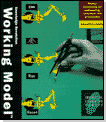Raccolta casi Working Model, visualNastran & SimWise - Mesa

Contatto Editoriale:
Paolo Lista,
Lista Studio srl®
Borgo Belvigo 33, 36016 Thiene Vi ITALY
tel/fax 0445,372479 o info@lista.it
Per ottimizzare questa trasmissione automatica in un veicolo commerciale, l'ing. Jeff Flinn ha scelto il Working Model al posto di altre soluzioni di analisi cinematica e dinamica in ambiente UNIX per la rapidità di calcolo, accuratezza dei risultati e facilità d'uso.
Working Model is going up against expensive Unix-based dynamics/ kinematics software packages at automotive companies -- and coming out ahead. Just ask Jeff Flinn, a consultant at Mesa Software in Ann Arbor: "I have been involved with kinematics & dynamics simulation for more than 12 years as both a consultant to automotive companies and as a software developer at Mechanical Dynamics Inc. I am astounded by Working Model’s capabilities, ease-of-use, and low cost."
Recently, Flinn and Mesa Software were contracted by an automobile manufacturer to develop a software simulation of a light truck’s automatic transmission column shift system. Working Model was chosen over physical prototyping or simulating the system with a Unix-based dynamics/kinematics package for several reasons. Most importantly, Working Model was able to model the system and provide accurate results in only 20% of the time estimated for each of the other methods. In addition, the simulations created with Working Model can be easily used and modified by product engineers to investigate the effects of design changes on future vehicle programs.
Flinn and the engineers on the project were very pleased with the results. Flinn states, "Working Model provided all of the necessary features to accurately model the system and determine the desired lash angle behavior. I was able to complete this simulation and have results much faster than would have been possible in the past."
COLUMN SHIFT SYSTEM.
The column shift system contains a shifter-pawl and a shifter-detent-plate sub-assembly. When the driver pulls on the shift-lever, the shifter-pawl is disengaged from the shifter-detent-plate, allowing the driver to rotate the shift-lever to the desired gear. When the driver releases the shift-lever, the shifter-pawl rests against the proper shifter-detent-plate notch for that gear.
Pawl/shifter-detent-plate function is important for several reasons. Accurate pawl/shifter-detent-plate positioning ensures proper automatic transmission gear engagement. Drivers also should receive a positive feel from the shifter column. A tight and robust feel is desirable. However, the required clearances for the column shifter system introduces undesirable lateral motion, leading to shifter-pawl/shifter-tube lash. Lash is a key factor in the performance of the column-shifter system, says Flinn, and must be accurately modeled in order to analyze the full system.
WHY WORKING MODEL?
One alternative to modeling the column shift system is to conduct tests on physical prototypes. The disadvantages of this approach are time and cost. Physical prototypes, while available for current production components, would have to be fabricated for conceptual designs. Design intent would be clouded by statistical variance of component dimensions for production units. The required accuracies of fabricated prototypes are also cost prohibitive.
Another alternative is to use a commercial Unix or mainframe based dynamics/ kinematics software package such as Adams and DADS. While these packages are very powerful in terms of the systems they can simulate, they require a significant amount of expertise and resources to create a simulation. Analysts estimated that it would take 8 to 10 weeks of FORTRAN programming and model building to simulate the system and retrieve the results from one of these packages. This would not have been much better than using physical prototypes.
Working Model from Knowledge Revolution was the ideal solution. Working Model is a full-featured, Windows and Macintosh based kinematics/dynamics simulation package that lets users create "virtual prototypes" of mechanical systems. Its graphical user interface drastically reduces design time and allows both analysts and product engineers to conduct sophisticated motion analysis. "Working Model’s ease-of-use puts an accurate motion analysis tool directly in the hands of product and manufacturing engineers -- the people who need motion simulation the most," says Pete Goettner, Director of Marketing at Knowledge Revolution.
SUCCESSFUL ANALYSIS.
Flinn completed the design and analysis in less than two weeks. The image at top shows the column shift system as it was simulated in Working Model. In this model, a 1 Newton force is applied to the side of the shifter tube to simulate preload on the shifter-tube. Object geometries were created in a CAD system, and then imported into Working Model using the DXF file format. The parameters of the various components of the column shifter were specified with only a few simple clicks of the mouse.
An important element of the column-shifter analysis is in how tolerances effect shifter-pawl/shifter-tube lash. To conduct this analysis, it was necessary that component collisions be simulated. Working Model is unique in that it automatically handles true native surface contacts and collisions. Collisions were set up in Working Model by simply specifying which bodies collided and which did not. The final step in the creation of the simulation was adding a meter to measure the shifter-tube rotation angle, velocity and acceleration. Once built, the simulation ran in only 4-5 minutes. To complete the analysis, simulations were run for a range of shifter dimensions and tolerances.
![[Transmission Picture]](trans.gif)
The results obtained with Working Model are now being used to improve the design of the automatic transmission column shift system. According to Flinn, "We were thrilled with how easy it was to obtain these results. Based on the success of this project, we plan on doing an even larger model of the shift-column system in Working Model. I believe that many product engineers in the automotive industry will soon be using Working Model."
